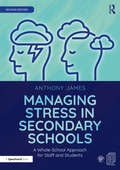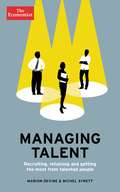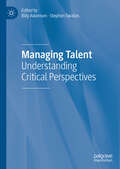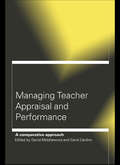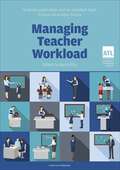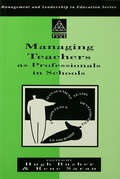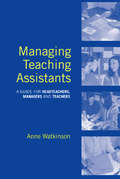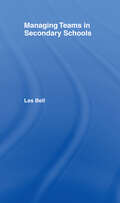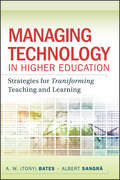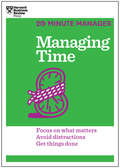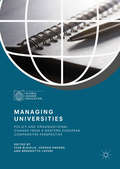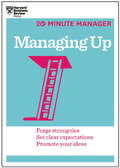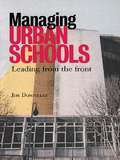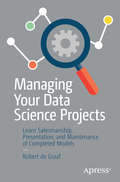- Table View
- List View
Managing Stress in Secondary Schools: A Whole-School Approach for Staff and Students
by Anthony JamesManaging Stress in Secondary Schools: A Whole-School Approach for Staff and Students, second edition, introduces a practical stress management programme for use in schools and colleges. Drawing from current theory and evidence-based practice on anxiety, stress and mental health, it offers student lesson plans, plus a staff self-training session, with concrete activities to develop crucial stress management skills in both staff and students. The programme provides direct training in stress reduction skills, supported by online resources, designed to fit into timetabled PSHE lessons. Key features of this manual include: Simple and flexible lesson plans that can be performed either at the start of timetabled PSHE lessons or as full stress management lessons on their own. A staff self-training session plan that serves both as preparation for leading lessons with students and facilitates the development of stress management skills among staff. Downloadable audio relaxation recordings. Downloadable handouts to encourage students’ relaxation practice at home. Downloadable PowerPoint slides to guide tuition. With lessons covering the causes and effects, as well as strategies on preventing and managing stress, this is an invaluable resource for teachers and other school staff involved in the PSHE curriculum. It would be of particular interest to those supporting students preparing for exams.
Managing Sustainable Performance and Governance in Higher Education Institutions: A Dynamic Performance Management Approach (System Dynamics for Performance Management & Governance #5)
by Federico CosenzThe fast-changing evolutionary process of global Higher Education systems systematically poses new challenges related to the appearance of innovative elements that lead academic governing bodies to question current managerial structures and methods. Due to this, theory and practice have gathered multiple contributions and experiences to support and further develop this evolutionary pathway during the past decades. Global competitiveness, economic and social growth are driven worldwide by knowledge and innovation. In this context, Higher Education Institutions play a crucial role as they primarily contribute to knowledge transfer and development and, as a result, foster regional development, employment, and economic wealth. The relevance of this role leads Universities to explore alternative solutions for managing their performance according to a sustainable perspective. This book draws on this flourishing debate on Higher Education policy and management and investigates an innovative systemic perspective to design and implement sustainable performance management systems for academic institutions. The conditions for the success of Universities, the critical issues underlying the creation of academic value, the dynamic complexity characterizing academic governance settings, the pluralistic audience of stakeholders and related expectations, the causal interplays between organizational performance variables, represent some of the central themes around which this work is developed. More specifically, the book suggests and discusses the adoption of a Dynamic Performance Management approach to frame the inherent organizational complexity of Higher Education Institutions, thus supporting a strategic learning perspective to design and implement relevant performance measures. This approach originates from the combination between conventional performance management and System Dynamics modeling. Many research and practice contributions prove that this methodological combination can boost the understanding and interpretation of value creation processes by identifying and exploring the causal connections amongst strategic resource allocation and consumption, corresponding performance drivers, emerging outputs, and outcomes. To test the effectiveness of this approach in University settings, a wide range of examples is offered in each book chapter. This allows readers to explore the advantages, limitations, and practical implications of adopting Dynamic Performance Management in Higher Education Institutions, as well as guide academic decision-makers towards a more robust approach to design and implement strategic management mechanisms in Universities.
Managing Talent: Recruiting, Retaining, and Getting the Most from Talented People (Economist Books)
by The Economist Marion Devine Michel SyrettSurvey after survey confirms how the success of businesses has become increasingly dependent on the ability and skills of their staff. And because talented workers are in short supply, the hunt for people of unusual ability will continue in earnest. Hiring such people is the relatively easy part; what really matters is to keep them engaged so that they don't move on, and to get the best out of them while they work for you.Drawing on original research, including interviews with senior executives in human resources, recruiters and headhunters, and people considered "talented" within their organizations, this book outlines the way in which companies such as Ford, Goldman Sachs, Cisco, Diageo, Tesco, General Electric and HSBC are facing the challenge of recruiting and developing the talent they need.This book will also boost readers' own career prospects with practical ideas on how to change their organization's perception of their potential.
Managing Talent: Understanding Critical Perspectives
by Billy Adamsen Stephen SwailesThis edited collection offers a critical appreciation of talent management in contrast to the extensive literature adopting mainstream approaches to the topic. The authors explore fundamental questions in the field to better understand why managing talent seems so attractive as a management practice, the meaning of talent, and how talent is recognised in organisations. The mix of conceptual and empirical chapters in the book teases out some critical perspectives that will provoke thought and reflection among practitioners and stimulate ideas for new research topics and approaches. The diverse contributions presented in this book will undoubtedly be of use to academics, practitioners and postgraduate students of human resource management.
Managing Teacher Appraisal and Performance
by Jane Martin Hywel ThomasThe biggest single issue currently facing school managers is how they should appraise their staff and what the implications of the process are. This edited collection brings together the latest thinking on the subject, from both the UK and overseas, and places it directly in the context of school management. Issues discussed include the role of appraisal in school leadership and the role of appraisal in developing teachers. The importance of this combined with the lack of published material on the subject make this book an essential purchase for all headteachers, heads of department, INSET co-ordinators and postgraduate educational management students.
Managing Teacher Workload: A Whole-School Approach to Finding the Balance
by Nansi EllisIt is acknowledged that the quality of teaching is the critical factor in raising standards of learning. And yet teachers' workload has rocketed in recent years, leaving morale for many at rock-bottom. Recent DfE analysis shows that primary teachers work around 60 hours a week and school leaders even longer. This is not sustainable. Teachers need an end to excessive working hours. Edited by Nansi Ellis, assistant general secretary at leading teaching union ATL, Managing Teacher Workload brings together leading educationalists to discuss real, practical ways to solve the biggest problem in the profession. Contributors include: Mary Bousted, General Secretary, ATL; Emma Knights, Chief Executive of the National Governors' Association (NGA); Heath Monk, Executive Director of the Schools of King Edward VI in Birmingham, former CEO of the Future Leaders Trust; Julian Stanley, chief executive, Education Support Partnership; Mary Myatt; Joe Pardoe; Lee Card; Toby French; Judith Vaughan; Collette Bradford
Managing Teacher Workload: A Whole-School Approach to Finding the Balance
by Nansi EllisIt is acknowledged that the quality of teaching is the critical factor in raising standards of learning. And yet teachers' workload has rocketed in recent years, leaving morale for many at rock-bottom. Recent DfE analysis shows that primary teachers work around 60 hours a week and school leaders even longer. This is not sustainable. Teachers need an end to excessive working hours. Edited by Nansi Ellis, assistant general secretary at leading teaching union ATL, Managing Teacher Workload brings together leading educationalists to discuss real, practical ways to solve the biggest problem in the profession. Contributors include: Mary Bousted, General Secretary, ATL; Emma Knights, Chief Executive of the National Governors' Association (NGA); Heath Monk, Executive Director of the Schools of King Edward VI in Birmingham, former CEO of the Future Leaders Trust; Julian Stanley, chief executive, Education Support Partnership; Mary Myatt; Joe Pardoe; Lee Card; Toby French; Judith Vaughan; Collette Bradford
Managing Teachers as Professionals in Schools (Management And Leadership In Education Ser.)
by Hugh Busher Rene SaranThis text examines the challenges facing education managers as the introduction of the National Curriculum, a number of Education Acts and the reorganization of management, have altered the concepts of teacher professionality and their statutory duties.
Managing Teaching Assistants: A Guide for Headteachers, Managers and Teachers
by Anne WatkinsonThis is a practical guide to the role, management, and deployment of teaching assistants. It offers comprehensive and informed support, underpinned by illustrative case studies throughout. Information and practical guidance is given on: the role and competencies of teaching assistants how to audit the existing teaching assistant provision in the school the teaching assistant's role in planning, delivery and feedback how to appoint, induct, mentor and appraise teaching assistants the effective management of teaching assistants by teachers and managers, and the need for a whole school approach opportunities for continual professional development for teaching assistants. This book is based on extensive observation of teaching assistants working in schools, and will have practical significance and implications for headteachers, senior management staff, teachers, LEA advisors, trainers and consultants.
Managing Teaching and Learning in Further and Higher Education
by Kate Ashcroft Lorraine Foreman-PeckThe role of the teacher/lecturer is to manage and facilitate the process of teaching and learning in a two-way interaction between teacher self and taught other. This handbook covers ways of managing the teaching, learning and assessment process to improve students' learning. It guides readers through paths of enquiry and reflection to create a learning programme designed to meet students' specific needs. The focus includes student learning and tutors' teaching and how these are effected by institutional arrangements; the interpersonal skills of tutors; and course design and teaching methods.; The text includes enquiry tasks which invite the reader to explore issues introduced in each chapter in the context of their own institution. An annotated reading list at the end of each chapter enables the reader to take their particular interests further.
Managing Teams in Secondary Schools
by Les BellFirst published in 1992. Routledge is an imprint of Taylor & Francis, an informa company.
Managing Technology in Higher Education
by A. W. Bates Albert SangraUniversities continue to struggle in their efforts to fully integrate information and communications technology within their activities. Based on examination of current practices in technology integration at 25 universities worldwide, this book argues for a radical approach to the management of technology in higher education. It offers recommendations for improving governance, strategic planning, integration of administrative and teaching services, management of digital resources, and training of technology managers and administrators. The book is written for anyone wanting to ensure technology is integrated as effectively and efficiently as possible.
Managing Time (20-Minute Manager Series)
by Harvard Business ReviewDoes it seem like you never have enough time to get everything done? Keeping on top of your tasks, deadlines, and work schedule can be daunting. Managing Time quickly walks you through the basics. You'll learn to: Assess how you spend your time now Prioritize your tasks Plan the right time to work on each one Avoid procrastination and interruptionsAbout HBR's 20-Minute Manager Series:Don't have much time? Get up to speed fast on the most essential business skills with HBR's 20-Minute Manager series. Whether you need a crash course or a brief refresher, each book in the series is a concise, practical primer that will help you brush up on a key management topic.Advice you can quickly read and apply, for ambitious professionals and aspiring executives-from the most trusted source in business. Also available as an ebook.
Managing Time (20-Minute Manager Series)
by Harvard Business ReviewBoost your productivity with these essential tips.About HBR's 20-Minute Manager Series:Don't have much time? Get up to speed fast on the most essential business skills with HBR's 20-Minute Manager series. Whether you need a crash course or a brief refresher, each book in the series is a concise, practical primer that will help you brush up on a key management topic.Advice you can quickly read and apply, for ambitious professionals and aspiring executives-from the most trusted source in business. Also available as an ebook.
Managing Time (20-Minute Manager Series)
by Harvard Business ReviewDoes it seem like you never have enough time to get everything done? Keeping on top of your tasks, deadlines, and work schedule can be daunting. Managing Time quickly walks you through the basics. You'll learn to: Assess how you spend your time now Prioritize your tasks Plan the right time to work on each one Avoid procrastination and interruptionsAbout HBR's 20-Minute Manager Series:Don't have much time? Get up to speed fast on the most essential business skills with HBR's 20-Minute Manager series. Whether you need a crash course or a brief refresher, each book in the series is a concise, practical primer that will help you brush up on a key management topic.Advice you can quickly read and apply, for ambitious professionals and aspiring executives-from the most trusted source in business. Also available as an ebook.
Managing Universities
by Benedetto Lepori Ivar Bleiklie Jürgen EndersThis book asks how modern universities are organized and managed, and questions whether 30 years of university reforms have resulted in stronger managerial structures and leadership control. It further asks whether current organisational and decision-making structures can be explained by public reform policies. The book offers a coherent, empirically grounded and theoretically driven presentation of data and core ideas behind a large scale comparative study of 26 universities across eight European countries. It focuses on the strength of university managerial structures, the role of academics, and how universities relate to and depend on their environment: to governments and other actors; to funders; to evaluators; and to external stakeholders. It further explores how higher education policies are shaped by and affect universities. Written by a cross-disciplinary team of European scholars, this book is unique both in its wide coverage and the depth of its analyses. It will be of great interest to scholars, graduate students and advanced undergraduates in the fields of organisation theory and sociology, policy studies, comparative public policy and administration, and higher education studies. It will also be of interest to higher education policy makers and administrators.
Managing Up (20-Minute Manager Series)
by Harvard Business ReviewYour boss plays an important role in your career. So how do you navigate this delicate, significant professional relationship without playing political games or compromising your character? Managing Up offers concise, expert tips on: Understanding your manager's priorities and pressures Setting a positive tone for the relationship Managing expectations-and egos Earning trust and respectAbout HBR's 20-Minute Manager Series:Don't have much time? Get up to speed fast on the most essential business skills with HBR's 20-Minute Manager series. Whether you need a crash course or a brief refresher, each book in the series is a concise, practical primer that will help you brush up on a key management topic.Advice you can quickly read and apply, for ambitious professionals and aspiring executives-from the most trusted source in business. Also available as an ebook.
Managing Urban Schools: Leading from the Front
by Jim DonnellyThe success of urban schools is a critical factor in the future of society. A dramatic statement for sure, but justified by the fact that eighty-nine per cent of the UK population live in urban areas. Traditionally, 'inner-city' schools have presented some of the greatest challenges to educators. With the ever increasing numbers of pupils and changing demographics, many urban schools now face similar challenges too. Tough, uncompromising and inspiring, this book makes a significant contribution to the understanding of how urban and city schools need to operate and how they need to be led. Headteachers, deputies, those studying for the National Professional Qualification for Headship, and all aspiring school leaders will find the help and guidance in this book invaluable in shaping their work. The book will also be helpful to policy-makers, LEA officials and governors. This is essential reading for anyone concerned with the reality of working in schools in contemporary Britain.
Managing Violence in Schools: A Whole-School Approach to Best Practice
by Dawn Jennifer Helen CowieThis timely text, written by experts in research, practice and training in the field, proposes a whole-school community approach to the reduction and prevention of school violence. Underpinned by recent research findings, the book is illustrated throughout with case studies, examples of good practice in action, ideas and resources including exercises, activities and checklists. The book covers: - personal characteristics of perpetrators, victims and bystanders - role of the family - ethos and culture of the school - quality of interpersonal relationships at school - quality of the learning environment of the school - links between school and community The authors' approach aims to promote non-violence , improve the climate of the school, enhance relationships among staff, pupils and parents, and to support the emotional health and well-being of all members of the school community. Strategies include preventative methods, provision for the individual needs of pupils and peer support, emotional literacy and restorative practice. The authors also provide guidance on how to create a shared understanding of school violence, how to prepare for change and how to carry out an effective needs analysis in order to successfully address the issue. This book is essential for practitioners, students in education and school management as well as local educational advisors.
Managing Your Academic Career: A Guide to Re-Envision Mid-Career
by Vicki L. BakerThe definitive resource for mid-career professionals in the academy, this book provides a step-by-step guide to re-imagining the mid-career stage, regardless of career goals, whether aiming for full professorship or an administrative path, drawing on higher education, organizational studies, and human resource fields. Essential guidance for scholars of faculty work, faculty developers, mid-career faculty members, and institutional leaders to build a strong foundation to design a diversified portfolio of mid-career stage programming is assured. The stories, examples, literature, and resources shared throughout this comprehensive work will provide inspiration, and reality checks, to mid-career faculty and the individuals charged with better supporting them. Readers will be able to: Identify their career (or departmental/institutional) goals and next steps Determine the gaps in needed skills, tools, and experiences to support goal achievement as next steps are pursued Manage the process of taking newfound skills, tools, strategies, and resources to arrive at the intended destination. Higher education faculty, administrators, and other academic leaders will be empowered to take control of the mid-career stage by using the resources, strategies, and tools offered throughout the book to build, implement, and assess a robust mid-career faculty development program.
Managing Your Academic Research Project
by Jacqui Ewart Kate AmesThis book is an essential resource for academics managing a large and complex research project. It provides important practical insights into the processes that inform such research projects and delivers insights into the delicate balance between industry, stakeholder and academic needs. It gives practical advice about developing relationships with diverse partners and colleagues and managing the expectations of the various parties involved and on avoiding pitfalls. This book uses examples from Australian research projects, but it contains insights relevant to researchers all around the world.
Managing Your Boss In A Week: Managing Up In Seven Simple Steps (Teach Yourself In A Week Ser.)
by Sandi MannThe ability to work successfully with your line manager is vital to anyone who wants to advance their career.Written by Sandi Mann, a leading expert on managing upwards as both a coach and a practitioner, this book quickly teaches you the insider secrets you need to know to in order to form a successful relationship with your boss.The highly motivational 'in a week' structure of the book provides seven straightforward chapters explaining the key points, and at the end there are optional questions to ensure you have taken it all in. There are also cartoons and diagrams throughout, to help make this book a more enjoyable and effective learning experience.So what are you waiting for? Let this book put you on the fast track to success!
Managing Your Boss In A Week: Managing Up In Seven Simple Steps (Teach Yourself In A Week Ser.)
by Sandi MannManaging your boss just got easierHaving a good working relationship with the person in charge is crucial to enjoying a positive and fulfilling work life. All of the problems created by difficult relationships can be avoided, in many cases, by simply learning the skills to successfully 'manage' your boss. Most of us think that it is the other way around - that the boss manages us - but the astute employee knows that it works both ways.If you understand how your boss operates, the inner working of their brain and their personality, you are far better able to meet their needs as an employee. And an employee who meets the needs and expectations of their boss will be a popular employee indeed!This book guides you through the process of managing your boss so as to ensure that you are ideally placed to become their favourite employee. Whether you choose to read it in a week or in a single sitting, this is your fastest route to success:- Sunday: What kind of animal is the 'boss'?- Monday: What type of boss do you have?- Tuesday: Using the psychological contract to manage your boss- Wednesday: How to impress your boss- Thursday: Getting more from your boss- Friday: Dealing with the boss from hell- Saturday: Common problems with managing the boss
Managing Your Data Science Projects: Learn Salesmanship, Presentation, and Maintenance of Completed Models
by Robert de GraafAt first glance, the skills required to work in the data science field appear to be self-explanatory. Do not be fooled. Impactful data science demands an interdisciplinary knowledge of business philosophy, project management, salesmanship, presentation, and more. In Managing Your Data Science Projects, author Robert de Graaf explores important concepts that are frequently overlooked in much of the instructional literature that is available to data scientists new to the field. If your completed models are to be used and maintained most effectively, you must be able to present and sell them within your organization in a compelling way.The value of data science within an organization cannot be overstated. Thus, it is vital that strategies and communication between teams are dexterously managed. Three main ways that data science strategy is used in a company is to research its customers, assess risk analytics, and log operational measurements. These all require different managerial instincts, backgrounds, and experiences, and de Graaf cogently breaks down the unique reasons behind each. They must align seamlessly to eventually be adopted as dynamic models.Data science is a relatively new discipline, and as such, internal processes for it are not as well-developed within an operational business as others. With Managing Your Data Science Projects, you will learn how to create products that solve important problems for your customers and ensure that the initial success is sustained throughout the product’s intended life. Your users will trust you and your models, and most importantly, you will be a more well-rounded and effectual data scientist throughout your career.Who This Book Is ForEarly-career data scientists, managers of data scientists, and those interested in entering the field of data science
Managing Your Emotions (Renew & Restore Bible Studies)
by ZondervanGod designed us to have emotions, but he doesn&’t want us to be controlled by them! In this Bible study, readers will learn how to master their emotions and achieve inner peace.We all have emotional ups and downs—they&’re part of everyday life. But some days, our feelings can seem out of control. We find ourselves reacting to everything that lands in front of us. We live at the mercy of our emotions, and we feel like we just can&’t help it.But it doesn&’t have to be this way.We can&’t control what we feel, but we can manage how we react to those emotions. We can take the time to understand the feelings that God has given us, explore what God says about them in His Word, and learn His techniques for how to manage them. When we do, it becomes easier to set down the things that are troubling us and make room for joy in our lives.Perfect for personal reflection or small groups, this Bible study will help you detach from the emotions that shape your day and cultivate the attitude you want.
